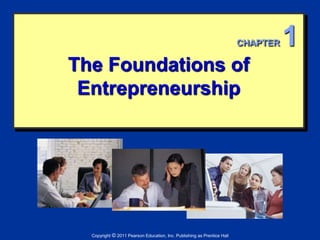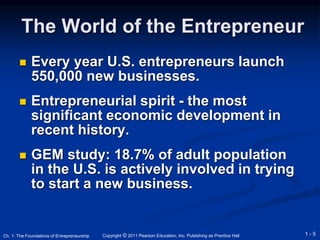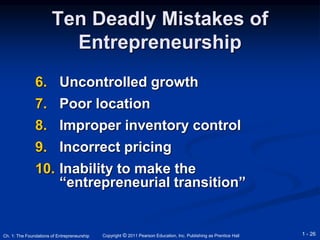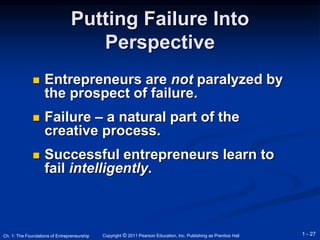Chapter 1 the foundations of entrepreneurship
- 1. The Foundations of Entrepreneurship Copyright ┬® 2011 Pearson Education, Inc. Publishing as Prentice Hall CHAPTER 1
- 2. Group Division Section C Zuckerberg Larry Page Bibek GL Monica GL Sangeet Bishal Kiran Nishan CR Ram Rajendra Rupa Shanta Sushma Copyright ┬® 2011 Pearson Education, Inc. Publishing as Prentice Hall 1-2
- 3. Group Division Section A Steve Jobs Bill Gates Rabina Namrata GL Amit Sabina Manish GL Rajan Rajib Prashna Roshani Suman Amrita Copyright ┬® 2011 Pearson Education, Inc. Publishing as Prentice Hall 1-3
- 4. Group Division Section C Sam Waltson Binod GL Krishna Sulav Jashmine Sabnam Anil Copyright ┬® 2011 Pearson Education, Inc. Publishing as Prentice Hall 1-4
- 5. The World of the Entrepreneur ’ü« Every year U.S. entrepreneurs launch 550,000 new businesses. ’ü« Entrepreneurial spirit - the most significant economic development in recent history. ’ü« GEM study: 18.7% of adult population in the U.S. is actively involved in trying to start a new business. Copyright ┬® 2011 Pearson Education, Inc. Publishing Ch. 1: The Foundations of Entrepreneurship as Prentice Hall 1 - 5
- 6. Copyright ┬® 2011 Pearson Education, Inc. Publishing Ch. 1: The Foundations of Entrepreneurship as Prentice Hall 1 - 6
- 7. The World of the Entrepreneur ’ü« Global Entrepreneurship Monitor (GEM) study reports: ’ü« Men are twice as likely to start a business as women. ’ü« Most entrepreneurs turn to family members and friends for capital. ’ü« Entrepreneurs are most likely to launch businesses when they are between the ages of 25 and 44. Copyright ┬® 2011 Pearson Education, Inc. Ch. 1: The Foundations of Entrepreneurship Publishing as Prentice Hall 1 - 7
- 8. What is an Entrepreneur? One who creates a new business in the face of risk and uncertainty for the purpose of achieving profit and growth by identifying opportunities and assembling the necessary resources to capitalize on them. Copyright ┬® 2011 Pearson Education, Inc. Ch. 1: The Foundations of Entrepreneurship Publishing as Prentice Hall 1 - 8
- 9. Characteristics of Entrepreneurs ’ü« Desire for responsibility ’ü« Preference for moderate levels of risk ŌĆō risk eliminators ’ü« Confidence in their ability to succeed ’ü« Desire for immediate feedback ’ü« High level of energy ’ü« Future orientation ŌĆō serial entrepreneurs ’ü« Skilled at organizing ’ü« Value achievement over money Copyright ┬® 2011 Pearson Education, Inc. Ch. 1: The Foundations of Entrepreneurship Publishing as Prentice Hall 1 - 9
- 10. Entrepreneurship ’ü« One characteristic of entrepreneurs stands out: Diversity! ’ü« Anyone ŌĆō regardless of age, race, gender, color, national origin, or any other characteristic ŌĆō can become an entrepreneur (although not everyone should). Copyright ┬® 2011 Pearson Education, Inc. Ch. 1: The Foundations of Entrepreneurship Publishing as Prentice Hall 1 - 10
- 11. Benefits of Entrepreneurship The opportunity to: ’ü« Create your own destiny ’ü« Make a difference ’ü« Reach your full potential ’ü« Reap impressive profits ’ü« Contribute to society and to be recognized for your efforts ’ü« Do what you enjoy and to have fun at it Copyright ┬® 2011 Pearson Education, Inc. Ch. 1: The Foundations of Entrepreneurship Publishing as Prentice Hall 1 - 11
- 12. Drawbacks of Entrepreneurship ’ü« Uncertainty of income ’ü« Risk of losing your entire investment ’ü« Long hours and hard work ’ü« Lower quality of life until the business gets established ’ü« High levels of stress ’ü« Complete responsibility ’ü« Discouragement Copyright ┬® 2011 Pearson Education, Inc. Ch. 1: The Foundations of Entrepreneurship Publishing as Prentice Hall 1 - 12
- 13. Feeding the Entrepreneurial Fire ’ü« Entrepreneurs as heroes ’ü« Entrepreneurial education ’ü« Demographic and economic factors ’ü« Shift to a service economy ’ü« Technology advancements ’ü« Independent lifestyle ’ü« E-commerce and the Internet Copyright ┬® 2011 Pearson Education, Inc. Ch. 1: The Foundations of Entrepreneurship Publishing as Prentice Hall 1 - 13
- 14. FIGURE 1.3 U.S. Retail E-Commerce Revenues Source: Based on Forrester Research, 2008. Copyright ┬® 2011 Pearson Education, Inc. Publishing Ch. 1: The Foundations of Entrepreneurship as Prentice Hall 1 - 14
- 15. Feeding the Entrepreneurial Fire (continued) ’ü« Entrepreneurs as heroes ’ü« Entrepreneurial education ’ü« Demographic and economic factors ’ü« Shift to a service economy ’ü« Technology advancements ’ü« Independent lifestyles ’ü« E-commerce and the Internet ’ü« International opportunities Copyright ┬® 2011 Pearson Education, Inc. Ch. 1: The Foundations of Entrepreneurship Publishing as Prentice Hall 1 - 15
- 16. The Cultural Diversity of Entrepreneurship ’ü« Young entrepreneurs Copyright ┬® 2011 Pearson Education, Inc. Ch. 1: The Foundations of Entrepreneurship Publishing as Prentice Hall 1 - 16
- 17. Copyright ┬® 2011 Pearson Education, Inc. Publishing as Prentice Hall 1 - 17
- 18. The Cultural Diversity of Entrepreneurship (continued) ’ü« Young entrepreneurs ’ü« Women entrepreneurs Copyright ┬® 2011 Pearson Education, Inc. Ch. 1: The Foundations of Entrepreneurship Publishing as Prentice Hall 1 - 18
- 19. FIGURE 1.4 Why Women Start Businesses Source: U.S. Small Business Administration, 2007. Copyright ┬® 2011 Pearson Education, Inc. Publishing Ch. 1: The Foundations of Entrepreneurship as Prentice Hall 1 - 19
- 20. The Cultural Diversity of Entrepreneurship (continued) ’ü« Young entrepreneurs ’ü« Women entrepreneurs ’ü« Minority-owned enterprises ’ü« Immigrant entrepreneurs ’ü« Part-time entrepreneurs Copyright ┬® 2011 Pearson Education, Inc. Ch. 1: The Foundations of Entrepreneurship Publishing as Prentice Hall 1 - 20
- 21. The Cultural Diversity of Entrepreneurship (continued) ’ü« Home-based businesses ’ü« Family businesses ’ü« Copreneurs ’ü« Corporate castoffs ’ü« Corporate dropouts ’ü« Social entrepreneurs ’ü« Retiring Baby Boomers Copyright ┬® 2011 Pearson Education, Inc. Ch. 1: The Foundations of Entrepreneurship Publishing as Prentice Hall 1 - 21
- 22. Small Businesses ... ’ü« Make up 99.7% of the 30.14 million businesses in the U.S. ’ü« Employ 51% of the nationŌĆÖs private sector workforce. ’ü« Create more jobs than big businesses. ’ü« 60% to 80% of net new jobs over the last decade ’ü« Are leaders in offering training and advancement opportunities to workers. Copyright ┬® 2011 Pearson Education, Inc. Ch. 1: The Foundations of Entrepreneurship Publishing as Prentice Hall 1 - 22
- 23. Small Businesses ... (continued) ’ü« Produce 51% of the nationŌĆÖs private GDP. ’ü« Account for 47% of business sales. ’ü« Create 13 times more patents per employees than large companies. ’ü« Zipper, light bulb, FM radio, laser, air conditioning, escalator, personal computer, automatic transmission, and many more! Copyright ┬® 2011 Pearson Education, Inc. Ch. 1: The Foundations of Entrepreneurship Publishing as Prentice Hall 1 - 23
- 24. FIGURE 1.5 Small Business by Industry Source: U.S. Small Business Administration, 2007. Copyright ┬® 2011 Pearson Education, Inc. Publishing Ch. 1: The Foundations of Entrepreneurship as Prentice Hall 1 - 24
- 25. Ten Deadly Mistakes of Entrepreneurship 1. Management mistakes 2. Lack of experience 3. Poor financial control 4. Weak marketing efforts 5. Failure to develop a strategic plan Copyright ┬® 2011 Pearson Education, Inc. Ch. 1: The Foundations of Entrepreneurship Publishing as Prentice Hall 1 - 25
- 26. Ten Deadly Mistakes of Entrepreneurship 6. Uncontrolled growth 7. Poor location 8. Improper inventory control 9. Incorrect pricing 10. Inability to make the ŌĆ£entrepreneurial transitionŌĆØ Copyright ┬® 2011 Pearson Education, Inc. Ch. 1: The Foundations of Entrepreneurship Publishing as Prentice Hall 1 - 26
- 27. Putting Failure Into Perspective ’ü« Entrepreneurs are not paralyzed by the prospect of failure. ’ü« Failure ŌĆō a natural part of the creative process. ’ü« Successful entrepreneurs learn to fail intelligently. Copyright ┬® 2011 Pearson Education, Inc. Ch. 1: The Foundations of Entrepreneurship Publishing as Prentice Hall 1 - 27
- 28. Avoiding the Pitfalls of Small Business Failure ’ü« Know your business in depth ’ü« Develop a solid business plan ’ü« Manage financial resources ’ü« Understand financial statements ’ü« Learn to manage people effectively ’ü« Set your business apart from the competition ’ü« Maintain a positive attitude Copyright ┬® 2011 Pearson Education, Inc. Ch. 1: The Foundations of Entrepreneurship Publishing as Prentice Hall 1 - 28
- 29. Conclusion Entrepreneurs: ’ü« Are an important part of the free enterprise system ’ü« Are a diverse and talented group of people ’ü« Represent a cross-section of society as a whole ’ü« Are able to enhance the profitability of their businesses through acquiring additional knowledge and experience Copyright ┬® 2011 Pearson Education, Inc. Publishing Ch. 1: The Foundations of Entrepreneurship as Prentice Hall 1 - 29
- 30. What is Ahead? Section 1: The Challenge of Entrepreneurship Section 2: Building a Business Plan: Beginning Considerations Section 3: Building a Business Plan: Marketing Considerations Section 4: Building a Business Plan: Financial Matters Section 5: Putting the Business Plan to Work: Making the New Venture a Success Copyright ┬® 2011 Pearson Education, Inc. Publishing Ch. 1: The Foundations of Entrepreneurship as Prentice Hall 1 - 30
- 31. All rights reserved. No part of this publication may be reproduced, stored in a retrieval system, or transmitted, in any form or by any means, electronic, mechanical, photocopying, recording, or otherwise, without the prior written permission of the publisher. Printed in the United States of America. Copyright ┬® 2011 Pearson Education, Inc. Ch. 1: The Foundations of Entrepreneurship Publishing as Prentice Hall 1 - 31






























